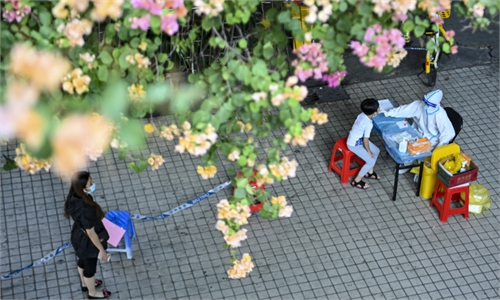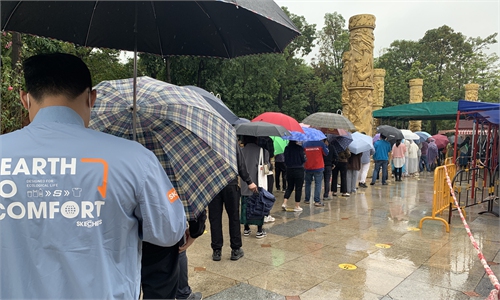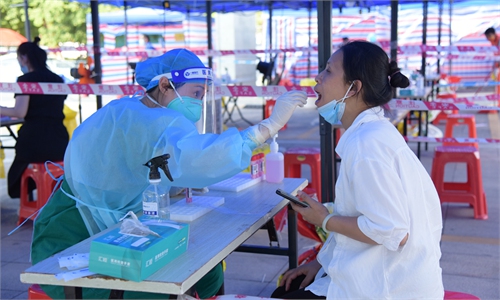
Medical workers conduct nucleic acid testing in communities in Zhengzhou, Central China's Henan Province, on November 5. Photo: VCG
Chinese local governments have vowed to rectify problems and put into practice more scientific and precise anti-epidemic measures, after national authorities on Saturday reiterated China's adherence to the dynamic zero-COVID strategy but criticized excessive and inappropriate anti-epidemic measures in some localities.
The Chinese mainland reported 526 confirmed cases and 3,894 asymptomatic cases for Saturday, according to data released by the National Health Commission on Sunday.
As the epidemic situation remains severe during the winter with the risk of influenza, Chinese experts also called for more scientific measures to both combat the viruses and minimize the impact on life and work.
At a press conference of the Joint Prevention and Control Mechanism of the State Council on Saturday, officials reiterated adherence to the dynamic zero-COVID strategy and criticized excessive and one-size-fits-all anti-epidemic measures during recent outbreaks in some places, such as Zhengzhou in Central China's Henan Province.
Zhengzhou officials apologized at a press conference on Sunday for the impact of excessive epidemic management measures brought about to local residents' life and work and vowed to resolutely rectify such excessive and one-size-fits-all measures.
Authorities in Hohhot in North China's Inner Mongolia Autonomous Region announced on Sunday that they reviewed the implementation of anti-epidemic measures in the city to improve service during the epidemic. They have banned the use of locks, latches and bolts in sealing apartments in high-risk areas.
Improper anti-epidemic practices violate the spirit of scientific, accurate and high-efficient epidemic prevention and control. They are serious problems of formalism and bureaucratism. China will increase scientific epidemic control and prevention levels and firmly rectify excessive measures and hold those who fail to implement full rectifications accountable according to the law, officials from the Joint Prevention and Control Mechanism of the State Council said at the Saturday press conference.
An Wei, the Party chief of Zhengzhou, vowed at a meeting on Saturday to resolutely prevent one-size-fits-all measures, calling for scientific and precise steps based on the daily epidemic situation.
An said that Zhengzhou will precisely identify low risk zones and restricted zones in order to prevent epidemic spread and reemergence, while avoiding an over-simplified anti-COVID-19 approach. An called on local authorities to "look back on" and rectify excessive measures during anti-epidemic work.
When encountering outbreaks, some local governments take anti-epidemic control as their top priority and take excessive steps that have caused inconvenience to the public, for example, some people complained online they had trouble purchasing food and daily living supplies and seeing doctors, Zhang Yuexin, an anti-epidemic specialist, told the Global Times.
Such behavior is putting the cart before the horse, which must be rectified, Zhang noted.
Local governments should learn from the Saturday press conference that three years into the COVID-19 pandemic, the public is in urgent need of balance between epidemic management and normal daily life, Chinese observers said.
It is clear that China will continue its efforts to prevent large-scale outbreaks. This is not just a task of local governments, but also the desire of the people. But anti-epidemic management does not simply equate to requiring people to stay at home and put large areas under control. This practice is not only unfriendly to people, but will damage local economies, observers noted.
They said that under the guidance of the dynamic zero-COVID strategy, local governments' anti-epidemic measures will become more and more scientific and precise, as they move to combat new resurgence.
Authorities in Haizhu district, Guangzhou in South China's Guangdong Province, required residents to avoid leaving home unless necessary for three days starting from Saturday, as the city is facing the "most complex and severest outbreak in three years."
Guangzhou registered 1,325 positive cases on Saturday alone, among which 1,253 were discovered in Haizhu district. Such an unprecedented number of positive cases is largely due to the high transmission and strong concealment of the Omicron variant, and because in dense residential areas with narrow alleyways, aerosol transmission of the virus is easy, Zhang Zhoubin from Guangzhou municipal disease prevention and control center said at a Sunday press conference.
Chinese experts also warned of dual risk of COVID-19 and influenza this winter. Zhong Nanshan, a top Chinese respiratory diseases expert, said at a forum in early November that more efforts are needed to tackle the scientific problems of influenza prevention and control during the COVID-19 pandemic. The world still faces the risk of a combined pandemic of COVID-19 and influenza, especially this winter, Zhong noted.
Facing the severe epidemic situation, Mi Feng, a spokesperson for the National Health Commission, reiterated at the Saturday press conference that China will continue to maintain its dynamic zero-COVID strategy as the country still faces multiple risks imposed by imported cases, domestic community transmission and influenza in winter.
Wang Guiqiang, an advisor to the National Health Commission and director of the Infectious Diseases Department at Peking University First Hospital, said at the Saturday press conference that the Omicron mutations are getting more contagious, making it more difficult to prevent and control the epidemic.
But China's current epidemic prevention and control strategies are still effective in preventing large-scale outbreaks, Wang noted. He said that current measures, including masks, hand hygiene and social distancing, are still very important means to control the spread of the virus and prevent infection.



